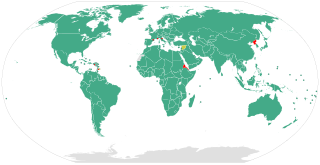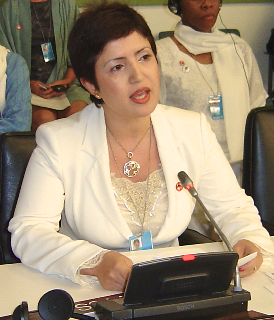
The Environmental Modification Convention (ENMOD), formally the Convention on the Prohibition of Military or Any Other Hostile Use of Environmental Modification Techniques, is an international treaty prohibiting the military or other hostile use of environmental modification techniques having widespread, long-lasting or severe effects. It opened for signature on 18 May 1977 in Geneva and entered into force on 5 October 1978.

The United Nations Security Council (UNSC) is one of the six principal organs of the United Nations (UN) and is charged with ensuring international peace and security, recommending the admission of new UN members to the General Assembly, and approving any changes to the UN Charter. Its powers as outlined in the United Nations Charter include establishing peacekeeping operations, enacting international sanctions, and authorizing military action. The UNSC is the only UN body with the authority to issue binding resolutions on member states.
Arms control is a term for international restrictions upon the development, production, stockpiling, proliferation and usage of small arms, conventional weapons, and weapons of mass destruction. Historically, arms control may apply to melee weapons before the invention of firearm. Arms control is typically exercised through the use of diplomacy which seeks to impose such limitations upon consenting participants through international treaties and agreements, although it may also comprise efforts by a nation or group of nations to enforce limitations upon a non-consenting country.

The Outer Space Treaty, formally the Treaty on Principles Governing the Activities of States in the Exploration and Use of Outer Space, including the Moon and Other Celestial Bodies, is a multilateral treaty that forms the basis of international space law. Negotiated and drafted under the auspices of the United Nations, it was opened for signature in the United States, the United Kingdom, and the Soviet Union on 27 January 1967, entering into force on 10 October 1967. As of August 2023, 114 countries are parties to the treaty—including all major spacefaring nations—and another 22 are signatories.
The small arms trade is the markets of both authorized and illicit small arms and light weapons (SALW), as well as their parts, accessories, and ammunition.

The United Nations Convention Against Corruption (UNCAC) is the only legally binding international anti-corruption multilateral treaty. Negotiated by member states of the United Nations (UN) it has been adopted by the UN General Assembly in October 2003 and entered into force in December 2005. The treaty recognises the importance of both preventive and punitive measures, addresses the cross-border nature of corruption with provisions on international cooperation and on the return of the proceeds of corruption. The UN Office on Drugs and Crime (UNODC) in Vienna serves as Secretariat for the UNCAC. UNCAC's goal is to reduce various types of corruption that can occur across country borders, such as trading in influence and abuse of power, as well as corruption in the private sector, such as embezzlement and money laundering. Another goal of the UNCAC is to strengthen international law enforcement and judicial cooperation between countries by providing effective legal mechanisms for international asset recovery.

A United Nations Parliamentary Assembly (UNPA) is a proposed addition to the United Nations System that would allow for greater participation and voice for members of parliament. The idea was raised at the founding of the League of Nations in the 1920s and again following the end of World War II in 1945, but remained dormant throughout the Cold War. The Campaign for a United Nations Parliamentary Assembly (CUNPA) was formed in 2007 by Democracy Without Borders to coordinate pro-UNPA efforts, which as of June 2017 has received the support of over 1,600 members of parliament from over 100 countries worldwide. The Commission on Global Security, Justice and Governance, chaired by former U.S. Secretary of State Madeleine Albright and former Nigerian Foreign Minister Ibrahim Gambari, has called for the creation of a United Nations Parliamentary Network "to raise greater awareness and participation by strengthening the voices of legislators in global institutions." The commission proposes that this Network "would be similar in initial composition to the Parliamentary Network on the World Bank and International Monetary Fund and the Parliamentary Conference on the World Trade Organization". In July 2018, the European Parliament adopted a recommendation to the European Council endorsing a proposal for the establishment of a United Nations Parliamentary Assembly.
The International Action Network on Small Arms (IANSA) was incorporated on 30 May 2002 under the laws of the United Kingdom of Great Britain and Northern Ireland. The IANSA London office was closed in 2015, but it has an active UN liaison office in New York. IANSA has had registration as an NGO in Ghana since 2014 to reflect the organizations commitments to bringing voices from the global south to the United Nations small arms disarmament process.

Small Arms and Light Weapons (SALW) refers in arms control protocols to two main classes of man-portable weapons.

Luis Alfonso de Alba Góngora is a Mexican diplomat.

Peter Richard Woolcott is an Australian public servant, diplomat and the former Australian Public Service Commissioner. He was previously the Chief of Staff to Prime Minister Malcolm Turnbull. Woolcott has served as the Australia's High Commissioner to New Zealand, the Australian Ambassador for the Environment, the Australian Permanent Representative to the United Nations in Geneva, the Australian Ambassador to Italy, the Deputy Head of Mission in Jakarta, and the Consul-General in Honolulu.

The International Campaign to Abolish Nuclear Weapons is a global civil society coalition working to promote adherence to and full implementation of the Treaty on the Prohibition of Nuclear Weapons. The campaign helped bring about this treaty. ICAN was launched in 2007. In 2022, it counted 661 partner organizations in 110 countries.

Widad Akreyi is a Kurdish health expert and human rights activist. She has co-founded the human rights organization Defend International and is the author of several books about both health issues and human rights.

The UN Office for Disarmament Affairs (UNODA) is an Office of the United Nations Secretariat established in January 1998 as the Department for Disarmament Affairs, part of United Nations Secretary-General Kofi Annan's plan to reform the UN as presented in his report to the General Assembly in July 1997.

The Anti-Counterfeiting Trade Agreement (ACTA) is a multilateral treaty for the purpose of establishing international standards for intellectual property rights enforcement that did not enter into force. The agreement aims to establish an international legal framework for targeting counterfeit goods, generic medicines and copyright infringement on the Internet, and would create a new governing body outside existing forums, such as the World Trade Organization, the World Intellectual Property Organization, and the United Nations.

The Arms Trade Treaty (ATT) is a multilateral treaty that regulates the international trade in conventional weapons.
The Preparatory Committees for an Arms Trade Treaty, commonly known as PrepComs, were the United Nations developmental committees for the Arms Trade Treaty. There were 4 PrepComs from 2010 to 2012, all tasked with researching and preparing recommendations for the negotiation of the Arms Trade Treaty. They presented their final report to the UN Conference on the Arms Trade Treaty in July 2012.
Events from the year 2013 in Syria.
United Nations General Assembly Resolution 31/72 referred the Environmental Modification Convention (ENMOD) “to all States for their consideration, signature, and ratification”. The resolution was adopted on 10 December 1976 at the 31st Session of the UN General Assembly. The convention aims to prohibit the military or other hostile use of environmental modification techniques that have widespread, long-lasting, or severe effects. The convention entered into force on 5 October 1978.

The Treaty on the Prohibition of Nuclear Weapons (TPNW), or the Nuclear Weapon Ban Treaty, is the first legally binding international agreement to comprehensively prohibit nuclear weapons with the ultimate goal being their total elimination. It was adopted on 7 July 2017, opened for signature on 20 September 2017, and entered into force on 22 January 2021.












